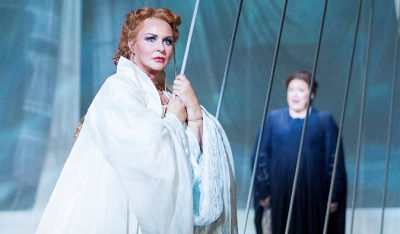by Paul J. Pelkonen

Irene Théorin is Isolde in Washington National Opera's Tristan und Isolde.
Photo by Scott Suchman © 2013 Washington National Opera/The Kennedy Center.
Tristan is never "easy." Wagner, inspired by his own non-affair with one Mathilde Wesendonck gave listeners three acts of chromatic longing, topped by the swelling, surging Liebestod at the very end. Here, the Washington National Opera Orchestra played with drive and attention to detail, even choosing to use the rare "Tristan Trumpet" (as the composer suggested--it's a wooden trumpet that sounds like an English horn) in Act III. Music director Philip Aucoin directed a surging performance that moved at a steady clip but stopped to explore the languors and beauties of this lush score.
The production ran into trouble earlier this month with the sudden exit of its Isolde: soprano Deborah Voigt. Luckily, Swedish soprano Irene Théorin (Brunnhilde in the WNO's recent attempt to mount the Ring) stepped in. She proved a more than adequate replacement, singing Isolde's Act I tantrums with considerable power and summoning tender, honey-dripping notes in the big Act II duet. She even found some comic elements in this normally serious opera, exhibiting a girlish impatience in the opening of Act II and impulsively extinguishing the torch as a signal to Tristan to meet her by the shrubberies.
As Tristan, Ian Storey chose to conserve his vocal resources in the first act. As a result, he sounded outmanned and outgunned in his first scenes with Ms. Theorin's angry Isolde, failing to rise to full volume over the orchestra in the Potion Scene. Mr. Storey improved greatly in the second act. As the couple started to sing "O sink' hernieder," the tenor opened up his chest voice, and remained at full strength for the remainder of the evening.
Tristan is, along with the title roles in Tannhäuser and Siegfried one of the three toughest Wagner roles for a tenor, made more so by the third act which features one of the longest and most pitiable death scenes in the operatic repertory. Mr. Storey's strategic approach to the difficulties of this role paid off handsomely, as the singer had the power and passion necessary for the long death scene. He was riveting in this three-part monologue, in a portion of this opera when an already exhausted audience sometimes finds itself lagging behind.
The payoff to all this suffering is the Liebestod, a ten-minute peroration over Tristan's corpse that ends in a glowing transcendence and a final resolution to the three dissonant chords that opened the Prelude to Act I. Ms. Théorin sang the first lines softly, introducing the famous rising theme with a subtle pianissimo. As the melodic line swelled, she rode the wave of the strings before reaching the series of erotic tonal climaxes that bring much-needed resolution to the final bars of the opera.
This show is all about the two lovers, but they were surrounded by an able cast. The best of these was bass-baritone James Rutherford's bluff Kurwenal who made the most out of his bully-boy scenes in Act I and III. Javier Arrey showed vocal promise as Melot, a high baritone role often taken by singers with Tristan in their future. Elizabeth Bishop was a fretful Brangaene, delivering a slow, haunting Watch Song in the Second Act. The only disappointment was Wilhelm Schwinghammer, an underwhelming, underpowered King Marke, lacking the heavyweight bass that one normally associates with Isolde's cuckolded husband.
This simple production mounts the work as simply as possible: a love story gone horribly wrong for the title characters. The set was a Lucite acting surface suspended by bridge-like cables. All the action floated on this transparent square, hovering over the stage and surrounded by shimmering, air-blown cyclorama curtains. In this minimal setting, the characters seemed cut off from reality, but firmly connected to each other. Tristan's ship, the gardens of Marke's palace and the desolate castle in Kareol all became the "same place," but that works: after all the only place that matters to Tristan and Isolde is the one that they can be in together.

